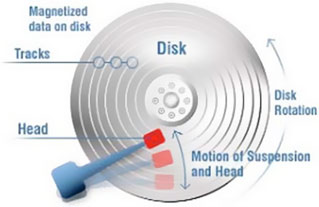Disk Performance
A computer is only as fast as its slowest component, and the disk is by far the slowest part of your computer. It is at least 100,000 times slower than your RAM (Random Access Memory) and over 2 million times slower than your CPU. When it comes to the speed of your PC, focus on disk performance first, before you opt for more memory or a faster CPU.
So what can be done to improve disk performance? Since fragmentation – the scattering or fragmenting of files on your hard drive from continually writing, deleting and resizing them – is a major cause of disk performance degradation, start with disk optimization.
So what causes fragmentation and why is it hurting my hard disk performance?
By the very nature of the way the Windows® operating system stores data on the hard disk – by breaking files into pieces all around the disk in tens, hundreds, even thousands of pieces per file – your PC naturally accumulates fragmentation.

How can I keep Windows systems running like new?
Since fragmentation is the primary cause of poor disk performance, anything that can be done to eliminate fragmentation is going to increase disk performance.
One of the primary reasons fragmentation hurts disk performance is because your hard drive head has to go and retrieve each and every piece of a fragmented file before you can access it. This excessive and unnecessary disk activity causes slow PC performance.
There are essentially two ways to address fragmentation. You can wait until it happens, then use defrag (the act of putting fragmented files back together), or you can prevent the fragmentation before it ever has a chance to slow down your disk performance.
Get the IDG Tech Dossier: Stop the HelpDesk Suffering – Keep PCs Running Like New »
Reactive Solution
The first defragmentation solution is a reactive approach to fragmentation and provides a temporary solution to an on-going problem. Just because you defrag your PC, doesn’t mean the problem has been solved. The minute you finish running your defrag, your PC will once again start accumulating increasingly more fragmentation with each and every use, so you feel like you are fighting a losing battle.
It also means that your PC is wasting resources by first writing fragmented files to your hard drive, and then requiring the defrag engine (built-in or other defrag only solution) to go to work locating and consolidating your files so that they that they are contiguous. This reactive, after-the-fact approach to fragmentation still leaves you vulnerable to an unreliable and slow performing PC.
Proactive Solution
The second solution, fragmentation prevention, is proactive, providing a more complete solution that keeps your disk performing at optimum speeds at all times. DymaxIO combines the best of both worlds by automatically handling any fragmentation that is already hurting your disk performance, and combining that with IntelliWrite® fragmentation prevention technology to stop future fragmentation before it happens. As a result, DymaxIO keeps your PC running better than new.
When your files are written to the disk contiguously (without fragmentation) rather than scattered across your disk, your PC doesn’t have to work as hard to read or write your files. Plus as an added bonus, the reduction in disk activity actually extends the life of your hard drive by an additional 1-3 years – saving you money in replacement costs.
Keep your corporate PCs running like new, request evaluation of DymaxIO and try it for yourself »
Find The Right Solution For Your Server Performance Challenge
We provide solutions for over 90% of fortune 500 companies and are dedicated to finding the right solution to remedy your Windows Server performance challenge too. Select your area of concern below.
What People are Saying
What People are Saying
“Typically, IT professionals respond to application performance issues by reactively buying more hardware. Without the luxury of a padded budget, we needed to find a way to improve performance on the hardware infrastructure we already have. It saved us from having to make a heavy investment in SSDs or do a complete rip and replace of our entire hardware infrastructure. To this day, I still can’t believe software is doing this.”
R. Ortiz, IT Manager, ASL Marketing
“I have used Diskeeper since it was first introduced. It has always worked well in keeping my drive defragged for the fastest response times for all of my apps. Thank you again for this fine piece of software.”
Philip Baldwin, NVQB
“The Undelete software that we use on all our Regional Servers is undoubtedly worth every penny. It
has saved our Techs numerous hours in restoring files inadvertently deleted as opposed to having to
restore from backup tape.”
Michael Lucas, Gancom (Division of Gannet Fleming)
“Undelete saves backup restores when someone accidentally deletes a file from a Windows share. We store tapes off site so Undelete can save a big delay for file restores of that type. Undelete does what it says on the box – really – and it works nicely as a network recycle bin.”
Glenn Edwards, Infrastructure Analyst, Itron
“I have been using Diskeeper for many years, it is installed as a routine on all servers, networked clients, SHO and any other computer. It has never presented any problem and has always demonstrated improved drive performance in both servers and clients. With each new release Condusiv does not merely provide “window dressing”, they actually improve the product with the objective of making it easier to use, more reliable, more effective and easier to use.”
Mark Sills, Systems Administrator / Manager, Home User
